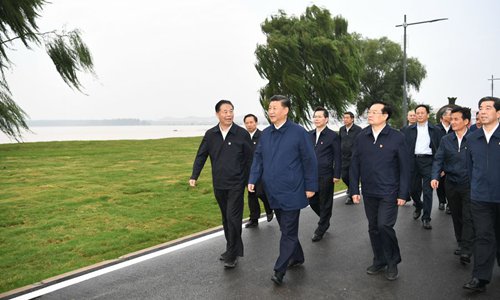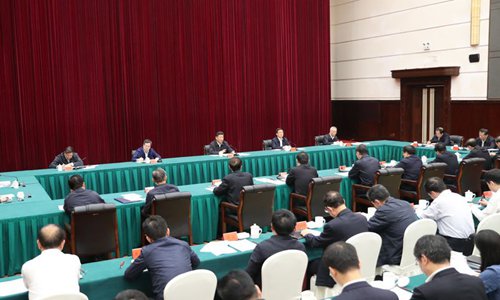
Chinese President Xi Jinping, also general secretary of the Communist Party of China Central Committee and chairman of the Central Military Commission, inspects the ecological protection of the Yellow River at a national geopark in Zhengzhou, capital of central China's Henan Province, Sept. 17, 2019. Xi chaired and addressed a symposium on the ecological protection and high-quality development of the Yellow River in Zhengzhou on Wednesday. (Xinhua/Xie Huanchi)

Chinese President Xi Jinping, also general secretary of the Communist Party of China Central Committee and chairman of the Central Military Commission, chairs and addresses a symposium on the ecological protection and high-quality development of the Yellow River in Zhengzhou, capital of central China's Henan Province, Sept. 18, 2019. (Xinhua/Ju Peng)
Chinese President Xi Jinping called for concerted efforts to promote ecological protection and high-quality development of the Yellow River.
Xi, also general secretary of the Communist Party of China Central Committee and chairman of the Central Military Commission, made the remarks while chairing a symposium Wednesday during his inspection tour to Henan Province.
NATIONAL STRATEGY
"The protection of the Yellow River is critical to the great rejuvenation and sustainable development of the Chinese nation," said Xi, adding that it is a major national strategy.
Noting that the peace of the Yellow River is significant to the stability of China, Xi said Chinese people have struggled against the floods and droughts of the Yellow River since ancient times, and the Party and the state have attached great importance to the harnessing and development of the Yellow River after the founding of New China in 1949.
Originating in Qinghai Province, the Yellow River, known as China's "Mother River" and the cradle of the Chinese civilization, runs through nine provinces and autonomous regions including Shaanxi and Henan before emptying into the Bohai Sea in east China's Shandong Province.
The river got its name Huanghe in Chinese because of its yellow, muddy water, which appears as it runs through the Loess Plateau in northwest China.
The 5,464-km-long waterway feeds about 12 percent of China's population, irrigates about 15 percent of arable land, supports 14 percent of national GDP, and supplies water to more than 60 cities.
Xi also pointed out difficulties and problems in protecting the Yellow River, including fragile ecological environment, severe condition of the water resources preservation and development quality that needs to be improved.
SOUL OF CHINESE NATION
Calling for strengthened protection of the ecological environment of the Yellow River basin, Xi said that differences between the upper, middle and lower reaches of the river should be fully considered, given that the Yellow River ecosystem is an organic whole.
Further efforts should be made to ensure the long-term stability of the Yellow River, Xi said, stressing that although the river has not seen major dangers for many years, we should not relax vigilance.
Over the past 2,500 years, the Yellow River has broken its dikes 1,600 times and has made 26 major changes in its course in the lower reaches.
Xi also stressed better use of water resources, with rational planning of the population, urban and industrial development to resolutely curb unreasonable water demand.
When pursuing high-quality development in the region, authorities should actively explore new ways with regional characteristics and participate in the construction of the Belt and Road to promote higher level of opening-up, Xi noted.
Meanwhile, Xi called for preserving, inheriting and carrying forward the Yellow River culture.
"The Yellow River culture, as an important part of the Chinese civilization, is the root and soul of the Chinese nation," Xi said, calling for telling well the "Yellow River story" to pool spiritual strength for the realization of the Chinese dream of the great rejuvenation of the Chinese nation.
For over 3,000 years, some major dynasties in Chinese history built their capitals in the river basin, making the region the centers of politics, economy and culture in the country.
The Yellow River witnessed the birth of the four era-defining inventions in ancient China -- printing techniques, papermaking, gunpowder and the compass, which all emerged in the drainage basin.
At Wednesday's meeting, Vice Premier Han Zheng, also a member of the Standing Committee of the Political Bureau of the Communist Party of China Central Committee called for efforts to earnestly study and implement the spirit of Xi's speech and strive to make new progress in the ecological protection and high-quality development of the Yellow River basin.

